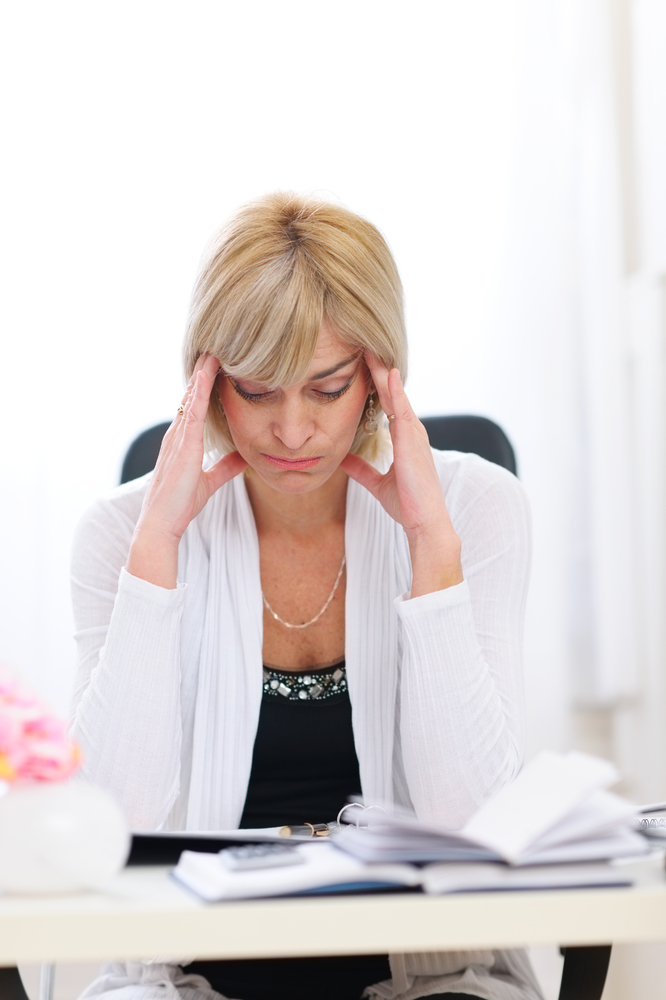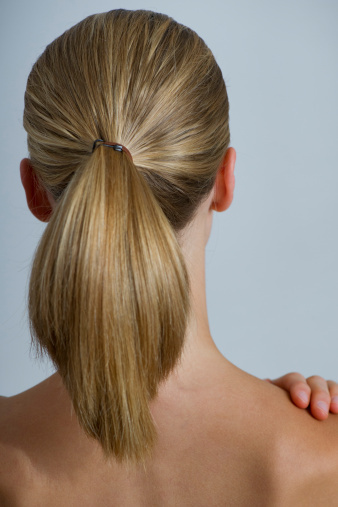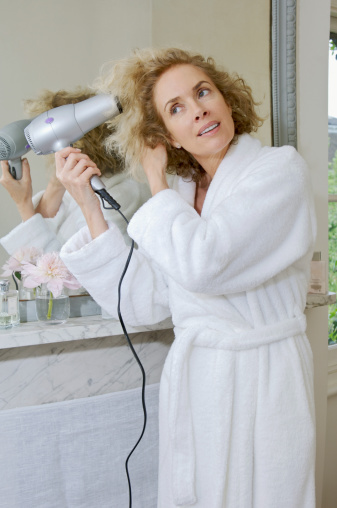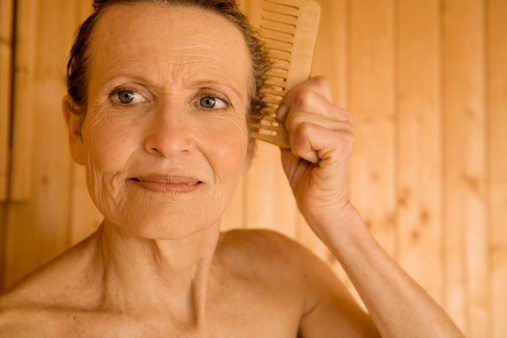Suddenly seeing clumps of hair on your pillow in the morning or clogging up the shower drain can be scary. But hair loss isn’t just from aging—there are some bad habits that could the cause. An average person loses between 50 and 100 hairs each day, according to the American Academy of Dermatology (AAD). If you’re seeing bald patches or thinning, however, read below to see if it’s your behavior that’s the culprit.
-
Habit #1: You’re stressed out
 If you experienced a traumatic event, like a divorce, your stress could be causing your hair loss. Extreme stress from “the three B’s – bereavement, bankruptcy, and break-up or divorce can knock emotions out and change the cycle of the hair,” says Jerry Shapiro, M.D., an adjunct professor in the Ronald O. Perelman Department of Dermatology at NYU Langone Medical Center. In fact, hair loss can occur six weeks to three months after a stressful event. This kind of hair loss is called telogen effluvium, which can also be caused by infections, major surgery, or having a baby. Think back over the last few months and see if there were any extreme stress events. (And keep in mind that regular everyday worries and stress probably will not lead to thinning hair.) The good news: for most, your hair will grow back normally once stress is reduced.
If you experienced a traumatic event, like a divorce, your stress could be causing your hair loss. Extreme stress from “the three B’s – bereavement, bankruptcy, and break-up or divorce can knock emotions out and change the cycle of the hair,” says Jerry Shapiro, M.D., an adjunct professor in the Ronald O. Perelman Department of Dermatology at NYU Langone Medical Center. In fact, hair loss can occur six weeks to three months after a stressful event. This kind of hair loss is called telogen effluvium, which can also be caused by infections, major surgery, or having a baby. Think back over the last few months and see if there were any extreme stress events. (And keep in mind that regular everyday worries and stress probably will not lead to thinning hair.) The good news: for most, your hair will grow back normally once stress is reduced.
-
Habit #2: Your ponytail is too tight
 Do you find yourself constantly pulling your hair back in a tight bun or ponytail? Do you wear tight braids or extensions? Over time, these styles damage the hair follicles, a condition known as traction alopecia. One tight hairstyle isn’t going to harm your hair, Dr. Shapiro says. But after many years, traction alopecia could cause permanent hair loss. Try changing it up with a new hairstyle, never use rubber bands to tie hair (they cause breakage, try fabric ones instead), and wear ponytails or buns in different areas of the scalp. For example, alternate between wearing a low and high ponytail.
Do you find yourself constantly pulling your hair back in a tight bun or ponytail? Do you wear tight braids or extensions? Over time, these styles damage the hair follicles, a condition known as traction alopecia. One tight hairstyle isn’t going to harm your hair, Dr. Shapiro says. But after many years, traction alopecia could cause permanent hair loss. Try changing it up with a new hairstyle, never use rubber bands to tie hair (they cause breakage, try fabric ones instead), and wear ponytails or buns in different areas of the scalp. For example, alternate between wearing a low and high ponytail.
-
Habit #3: Too much blowdrying
 Too much of anything can be bad—and that certainly applies to hair products and stylers. Try your best to limit your use of blow dryers, straighteners, and curling irons. Very high heat from blow dryers and the like can lead to breakage, making the hair more prone to falling out. While Dr. Shapiro says that blow drying and using products like relaxers normally won’t cause thinning problems unless the heat is excessive, according to the American Academy of Dermatology, “some of the products you use on your hair can cause hair loss.” The ADD recommends air-drying hair as much as possible, and never use straighteners or curling irons on wet hair.
Too much of anything can be bad—and that certainly applies to hair products and stylers. Try your best to limit your use of blow dryers, straighteners, and curling irons. Very high heat from blow dryers and the like can lead to breakage, making the hair more prone to falling out. While Dr. Shapiro says that blow drying and using products like relaxers normally won’t cause thinning problems unless the heat is excessive, according to the American Academy of Dermatology, “some of the products you use on your hair can cause hair loss.” The ADD recommends air-drying hair as much as possible, and never use straighteners or curling irons on wet hair.
-
Habit #4: Brushing hair when wet
 Many of us hop out of the shower and run a brush through our damp strands to untangle. But brushing wet hair can cause breakage since wet hair is more delicate. Try to let hair dry before brushing. If you can’t, use a comb on wet hair instead of a brush, and be gentle. And even once it’s dry, avoid brushing too much. Remember the old advice to brush your hair 100 times every day? Bad idea, says the AAD. All that tugging will cause your hair to break.
Many of us hop out of the shower and run a brush through our damp strands to untangle. But brushing wet hair can cause breakage since wet hair is more delicate. Try to let hair dry before brushing. If you can’t, use a comb on wet hair instead of a brush, and be gentle. And even once it’s dry, avoid brushing too much. Remember the old advice to brush your hair 100 times every day? Bad idea, says the AAD. All that tugging will cause your hair to break.
-
Habit #5: Eating the wrong foods
 A healthy, balanced diet is the key to everything, including healthy hair. A diet that is not high enough in iron or protein can lead to hair loss, says Dr. Shapiro. Those with eating disorders and those who crash diet often experience hair loss. If poor diet is your issue, you can usually reverse hair loss by balancing your food intake. Good sources of protein include meat, eggs, fish, nuts, beans, and seeds; add iron to your diet with foods like lentils, green foods like spinach and other veggies, cereals fortified with iron, clams, and oysters.
A healthy, balanced diet is the key to everything, including healthy hair. A diet that is not high enough in iron or protein can lead to hair loss, says Dr. Shapiro. Those with eating disorders and those who crash diet often experience hair loss. If poor diet is your issue, you can usually reverse hair loss by balancing your food intake. Good sources of protein include meat, eggs, fish, nuts, beans, and seeds; add iron to your diet with foods like lentils, green foods like spinach and other veggies, cereals fortified with iron, clams, and oysters.
The body uses vitamin A to help with vision and hair growth, however, high levels of vitamin A can have a converse effect and contribute to hair loss. Avoid taking excessive vitamin supplements that could cause a spike in your vitamin A. Certain medications can also be responsible for elevated vitamin A levels, particularly retinoids commonly used to treat acne and psoriasis. While you are taking retinoids there is not much you can do about hair loss, says Dr. Shapiro. However, once you stop medication or excessive supplements, your hair should resume its normal growth.
One other vitamin to pay attention to: vitamin D. Though studies are not conclusive, some research suggests that low levels of vitamin D and iron can cause thinning hair in women. Ask your doctor to test your vitamin D and iron levels, and discuss whether or not you should take a vitamin supplement.
What if your habits aren’t the cause?
There are many other reasons your hair may be thinning:
- Some prescription medications, like those used to treat arthritis, depression, and high blood pressure can cause hair to fall out.
- Auto-immune diseases like lupus cause the body to attack it’s own healthy cells, including skin and scalp, which can lead to hair loss.
- Thyroid problems. Talk to your doctor and ask her to test your thyroid to make sure it’s functioning properly—hair loss can be a sign of hypothyroidism.
- Hormone imbalance. As women age and hormones change there can be a surge of the hormone dihydrotestosterone (DHT), which can cause hair on the head to thin, while hair to sprout on the chin and face.
- Hereditary hair loss. According to the ADD, 80 million men and women experience alopecia, or common hereditary hair loss.
If your habits aren’t causing your hair to thin, talk to your doctor.





